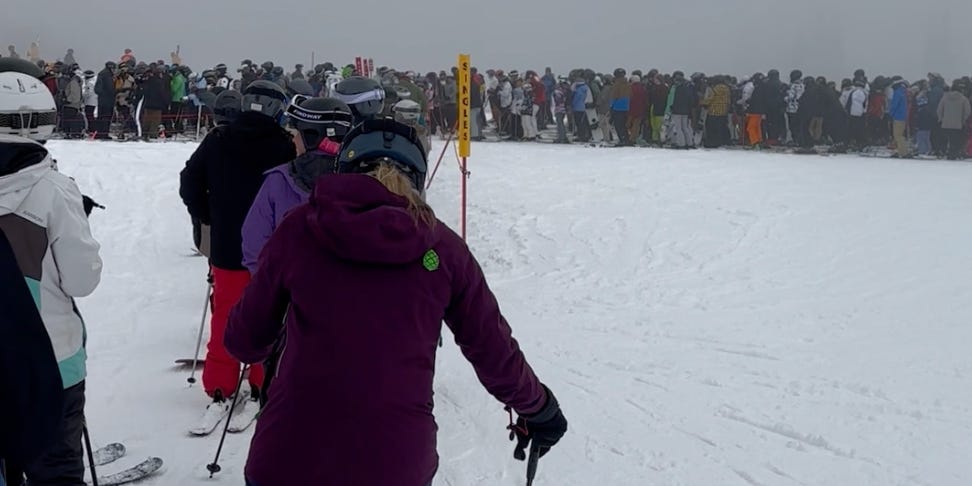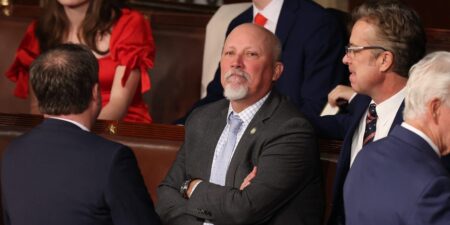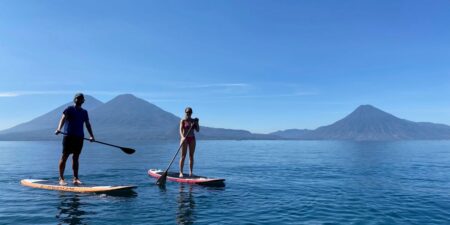- About 200 ski patrollers are on strike for better wages at Utah’s Park City Mountain Resort.
- Large swaths of the mountain have been closed, and lift lines have been long, frustrating customers.
- Some customers told BI they won’t return to corporate resorts, instead opting for family-run spots.
Skiers at Utah’s Park City Mountain Resort say their vacations were spent waiting in painfully long lines and navigating overcrowded trails after hundreds of ski patrollers and mountain safety personnel walked off the job.
The work stoppage over wages at one of the nation’s largest ski resorts came as more than two feet of snow blanketed Park City in the last week — normally, a skier’s dream. But for Jim Lebenthal, the snow was mostly experienced from the back of a line.
“It started out bad, and it got worse,” said Lebenthal, a partner at a wealth management firm.
Lebenthal, also a CNBC contributor, said that 75% of the mountain was closed on his family’s first day of skiing on December 27. By December 30, he said 80% of the mountain was closed.
“The lift lines were interminable,” Lebenthal said. “It got to the point where it was one run an hour, and a run takes probably seven minutes, and the rest of that is sitting in lift lines.”
TF Jenkins, a managing director at a Florida-based wealth management firm, said the closures resulted in limited options.
“There wasn’t a ton of terrain open, and we were just doing the same thing over and over again,” Jenkins said.
Many resort guests took to social media to complain about the conditions. Vail Resorts Inc., which owns the resort, saw its stock drop about 6% in the last week.
A strike during peak ski season
The Park City Professional Ski Patrol Association (PCPSPA) said it has been in contract negotiations with Vail Resorts since April and is trying to secure wage increases to match inflation, among other things.
About 200 ski patrollers, represented by the union, went on strike on December 27 after negotiations with Vail Resorts broke down.
The resort remained open, “with safety as its top priority,” the resort said in a statement.
A spokesperson from the resort told BI that December 30 was “especially challenging” due to early season conditions.
“Each day, we open the terrain we can safely open with the team members we have,” Sara Huey, Vail Resorts’ Director of Community and Government Affairs, told BI in a statement. “We have had impacts to terrain as a result of the patrol strike.”
The union’s demands
Vail Resorts said in a statement that it had reached agreements on 24 out of 27 contract terms. The remaining issues were contract length, wages, and benefits — often considered by members to be the most important parts of a contract.
Bill Rock, the President of Vail Resorts’ Mountain Division, said the resort has made “significant investments” in its staff.
“Our wages and benefits are strong, as demonstrated by the high return rate among patrol teams across our company and by the number of applicants we get for any patrol opening,” Rock said in a statement.
But that doesn’t match up with the lived experiences of ski patrollers, said Margaux Klingensmith, a business manager for the union and six-year patroller at Park City Mountain.
“We have patrollers who cannot afford to continue doing this job if they are not compensated better for it,” Klingensmith told BI.
The union wants patroller base pay raised from $21 to $23 with an included cost-of-living adjustment.
It also wants to combat wage compression, which Klingensmith said has allowed five-year patrollers to be making the same amount as 15-year patrollers, who are significantly more experienced. Better compensation would help retain those experienced patrollers, which Klingensmith said the resort is losing “at an atrocious rate.”
“Trying to keep that experience around with a better compensation package is the real goal. But overall, the reason we’re fighting for this is to make sure that we have members of our unit able to afford groceries and afford to pay their rent,” Klingensmith said.
The union is also seeking better benefits for its members, including a healthcare stipend, accruing paid time off, and parental leave.
Customers say they won’t be back
The PCPSPA said its members unanimously passed a strike authorization vote on December 13. In the days following, Deirdra Walsh, the VP and COO of Park City Mountain, issued several statements on Park City’s website stating that the mountain would remain open “regardless of the union’s actions.”
Still, customers told BI that they felt Vail Resorts did not effectively communicate to them that their visit could be impacted by a strike.
“They should have let us know that this was potentially going to happen,” said Lebenthal, who added that he would seek a refund if possible.
Jenkins also said he was frustrated by what he called a lack of communication from Vail Resorts. Jenkins, who bought four-day passes for his family eight months in advance, said he has reached out several times for a refund.
Jenkins added that there were also communication issues regarding wait times for the lifts.
“It would give you the wait times on the app for each lift that was open, and it would say five minutes, and you’d get there, and it’d be like 40 minutes.”
He said it’s common for mountains to be crowded, but this week’s experience at Park City turned into a safety issue with skiers of varying levels zipping down crowded trails.
“This was a human-created situation without a whole lot of communication. I mean, we would’ve been fine sitting in and playing games all day if it was just not great snow and not great weather, but it was more frustrating when it’s created by two different parties,” Jenkins said. “It’s all kind of been a zero-sum game.”
Going forward, Jenkins said he will only ski at smaller, family-owned resorts.
“There may be a little more driving because they don’t necessarily have lodging right next to the mountain, but I would rather support smaller local communities than this type of stuff,” Jenkins said. “We won’t go back to a corporate mountain.”
Read the full article here
















